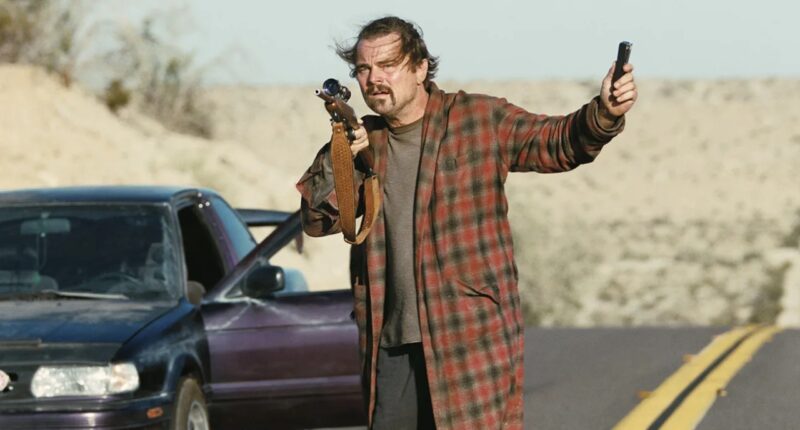The Battles Continue
Shortly after the reunion of Bob and Willa, we check back in on Lockjaw, who has incredulously survived the ordeal, albeit now badly disfigured. The leaders of the Christmas Adventurers Club know that Lockjaw is Willa’s biological daughter, the result of his coupling with Perfida Beverly Hills (Teyana Taylor), a French 75 revolutionary, Bob’s girlfriend, and—most worrisomely for the racists who make up the club—a Black woman. Despite being uncomfortably open about his fetishization of Black women earlier in the film, Lockjaw now insists that he was (in his phrasing) “reverse raped” by Perfida and the French 75.
Much to his shock, the club leaders seem to buy the explanation and induct him into the organization. Lockjaw allows himself to revel in his victory as a Christmas Adventurer shows him around and brings him into his office. Yet no sooner does the door shut on Lockjaw’s office than the room fills with gas, killing the man at his highest point. We then watch as henchmen take out Lockjaw’s body and cremate it.
For some, Lockjaw’s death provides a type of catharsis, showing the utter degradation of an older body that was clearly fashioned to a Robert F. Kennedy Jr. level of musculature. However, the scene also makes a larger point about the nature of the white supremacy embraced by the club and instiutional power. A secret society built around arcane rituals riffing on pop cultural kitsch, the Christmas Adventurers Club is the clearest sign of One Battle After Another‘s debt to the work of Thomas Pynchon, whose 1991 novel Vineland inspired Paul Thomas Anderson‘s film.
While the movie retains some of the postmodern playfulness found in Pynchon, Anderson takes a more sober approach to the threat of white supremacy, particularly in its shockingly realistic depiction of militarized police. That seriousness makes the final scenes featuring the Christmas Adventurers Club not a relief that Lockjaw is dead, but rather a reminder that the club remains in power, full of hate and with endless resources. It reminds the viewer that the battles continue. And the enemy is not only entrenched, but also capable of eating their own without mercy, accountability… or anything approaching a sense of humanity and true kinship.
An American Girl
But let’s compare Lockjaw’s fate with that of his intended prey. As shocking as it is when she pulls a gun on her father and demands that he complete the code phrase, Willa’s actions are consistent with her character arc. She began the movie simply wanting to be the American ideal of a normal teenager. She wants to just go to a high school dance with her friends, to admire her mother (whom she thinks died a hero), and to not have to worry about her father’s reckless behavior and his antiquated rules of passcodes and subversive politics. And yet, all that falls apart when Lockjaw sends a squad of police officers in fatigues and carrying assault weapons into her high school.
By the end of the film, we’ve seen her train with weapons, outsmart Lockjaw and other cops, and escape from bounty hunters. Through a trial by fire she’s quickly grown into an adept revolutionary, especially in contrast to the man who raised her. For every demonstration of competence on Willa’s part, we find an example of Bob mucking things up, most notably his inability to remember any of the password phrases.








